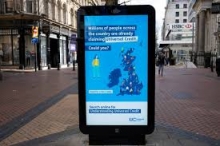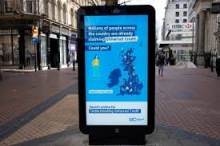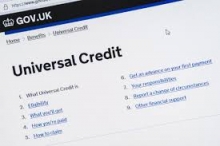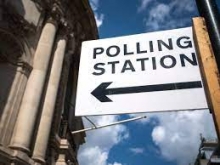Work TV
Watch our TV Channel dedicated to the ‘World of Work’. Explore our video library for informative videos featuring career opportunities at leading companies, franchising opportunities, further education and recruitment professions and their services.
Simon Collyer
The Young Lady Who Contacted Us Sorry We Deleted Your Voicemail
HELP NEEDED - To the young lady who contated us about a Universal Credit issue 29/06/2022 your voicemail message was deleted in error.
Shows we are human after all.
ABC Comment have your say below

UC Claimants Illegally Forced to Repay Entire Award By DWP
UNIVERSAL CREDIT - Claimants are being illegally forced to repay their entire universal credit (UC) award even though they were fully entitled to it, the Child Poverty Action Group (CPAG) has revealed. Third party debt collectors are even being used to carry out the unlawful recoveries.
According to CPAG, the DWP relaxed some of the evidence rules for UC claims during the pandemic.
But in January 2021 the DWP began a process of reverification, looking again at those claims and making a decision about whether they were legitimate.
This process is to be ramped up dramatically, with the DWP announcing it will establish a team of 2,000 staff to look again at 2 million claims over the next five years including, but not limited to, claims made during the pandemic.
CPAG says that they are hearing from an increasing number of people who have had their UC stopped, have been ordered to repay all the UC they received in the past and who often don’t understand the reasons for the DWP’s decision or how they can challenge it.
CPAG say that they have serious concerns about the process, including:
Claimants who appear to be fully entitled to what they received being ordered to repay all their UC.
The DWP’s approach to retrospectively deciding claimants were not entitled and beginning recovery is unlawful.
Claimants are not given enough information to understand why the DWP think they have been overpaid or how they can challenge the decision.
The DWP asked for evidence of entitlement via the online journal, even from claimants who were no longer getting UC and would have no reason to check their journal.
Some claimants only finding out about the alleged overpayment when they received a letter from DWP Debt Management, therefore missing the one month deadline for challenging a decision and not knowing that they could make a late challenge if they have good cause.
Some claimants who do challenge the decision make repayments they do not need to make whilst waiting many months for the DWP to carry out a mandatory reconsideration or may face demands from third party debt collectors.
CPAG are asking the DWP to make a range of changes, including pausing the recovery of overpayments whilst a decision is being challenged, as happens with other benefit,s and making decisions that actually comply with the law.
CPAG have been around for over 50 years. They write handbooks that are relied upon by anyone connected with welfare rights and take numerous cases to court on behalf of claimants. They are not headline seekers or sensationalists.
If they say that the DWP is acting unlawfully, you can rely on it being true.
The thought that a government department that behaves like this is to be given powers of search, seizure and arrest, along with the right to impose fines where there isn’t sufficient evidence for a criminal trial, is truly frightening.
ABC Comment, have your say below:

Cost of Living Support Payments You May Be Entitled To
EXTRA HELP - Extra help is available for claimants struggling with the cost of living crisis.
July 6: National Insurance threshold raised
On July 6, the threshold of what you can earn before paying National Insurance will rise from £9,880 to £12,570 a year. It will take some of the lowest earners out of paying the tax and save those still paying £330 a year.
But that’s before you factor in two things: firstly, National Insurance rose in April from 12% to 13.25%. Once you put the tax and threshold rises together, only people who earn less than £37,000 will be better off than they were before April. And they might not feel like celebrating - £30k earners are only £53 better off per year.
Secondly, if you’re working but on Universal Credit, you’ll feel less help because for every pound you earn, 55p of benefits are “tapered” away. Models suggest a single parent on £16,000 and UC will gain £27 a month from the threshold change but £15 of that will be cut in Universal Credit. This applies throughout the UK.
July: £325 for most benefit claimants
More than eight million UK claimants of Universal Credit, Tax Credits, pension credit and legacy benefits will get two payments of £325 each. If you’re on any of these benefits except Tax Credits, your first payment will arrive in your bank account “from” July.
The exact payment date is not yet confirmed and will likely depend on when you get Universal Credit during the month. Claimants must have begun a claim for these benefits by May 25, 2022, at the latest, to qualify for the first of the two payments. The £650 will be tax-free, will not count towards the benefit cap, and will not have any impact on existing benefit awards. This applies throughout the UK.
Even though benefits and pensions are not being permanently raised now - something many have called for - there will be a big rise next year. April 2022's rise was a measly 3.1%, below inflation, because it was based on the CPI figure for September 2021. But in April 2023 the rise could be an above-inflation 10%.
Rishi Sunak said he would stick to that plan, subject to a review by the Work and Pensions Secretary. He said: "On current forecasts, it's likely to be significantly higher than the forecast inflation rate for next year."
Mr Sunak also said the triple lock will return to the state pension - ensuring it rises by inflation, wages or 2.5%, whichever is highest. That means pensions are likely to rise by around 10% too. This isn't a surprise but is a big commitment after the Tories broke their manifesto pledge on the triple lock last time. This applies throughout the UK.

Image: Rishi Sunak, Chancellor.
ABC Comment, have your say below:

Extra Help For Struggling Families With Cost of Living Crisis
COST OF LIVING - Chancellor Rishi Sunak has announced his plan to help UK households struggling with the cost of living crisis.
The announcement comes after Brits were hit by a series of price increases. Last week, households learned that inflation rose to a 40 year high of 9% in April, and just this week Ofgem revealed that the energy price cap is set to be raised by a further 41% in October.
Eight million low income households will be receiving a one off payment to help offset recent price hikes.
“According to Rishi Sunak, the payment is designed to offer ‘significant targeted support’ to millions across the country, that’s nearly a third of all UK households.
“Those on benefits will receive a payment of £650, with pensioners receiving a smaller but still significant sum of £300. Those on non means tested disabilities will also receive a payment of £150.
“The good news is that you don’t need to apply for the cash grant. If you’re eligible, the money will be automatically transferred to your bank account over two months, with the first payment being made in July, followed by a second one in autumn.
“If you’ve been struggling in recent months and haven’t been claiming any state support, now is the time to check what you’re entitled to. Schemes like Universal Credit will help the lowest earners, and when combined with the new cash grant, could provide significant support during this challenging time.
Check out this guide on what benefits you’re entitled to here.”
“The other key area of the Chancellor’s announcement focused on the recent rise in energy costs.
“As well as confirming a temporary windfall tax on oil and gas giants, it was also announced that anyone who has taken out the government’s £200 energy rebate will not have to pay it back. What’s more, the rebate, which is still available, has been increased to £400.
“While the rebate is great news, there’s no denying that energy bills are still at an all time high. For some easy tips and tricks on how you can reduce your energy bill visit: https://www.money.co.uk/guides/tips-to-reduce-energy-bills”
ABC Comment, have your say below:

Managed Migration to Universal Credit
UNIVERSAL CREDIT - Today letters will be sent to 500 people who receive one of the benefits being replaced by universal credit (UC), marking the resumption of the government’s “managed migration” to UC after it was paused during the pandemic. Between now and December 2024, 2.6 million people will move from older benefits to universal credit.
A lot is at stake with managed migration. When people receive one of these letters from DWP they will be instructed to make a claim for universal credit before the “deadline date”. But some people will struggle to make this transition – if they have not understood the letter, are severely ill, have learning difficulties, are in the aftermath of domestic violence, lack digital access or have limited literacy, for example. Those who miss the DWP’s prescribed deadline face losing their benefit income altogether, including any transitional protection that would be provided if they would be worse off on universal credit than on their previous benefits (approximately 900,000 people). For many of those affected, benefits make up the vast majority, if not all, of their income – not making the transition will result in destitution. It’s crucial that we get this right.
That’s why it’s deeply concerning that the DWP has abandoned its plan to pilot managed migration, evaluate the process and report to parliament on what improvements need to be made. The pilot, which began in 2019, was paused at the start of the pandemic, by which point only 38 people had been moved to UC. The DWP has now confirmed that no further piloting will take place which means that the outcomes cannot be evaluated and put to public scrutiny as planned.
So whereas before we could take some comfort from the fact that the department’s migration approach would be road-tested before full roll-out, now millions of claimants will be asked to move to UC in a scheme based on the experiences of just 38 people.
Instead of a pilot, the DWP is entering a “discovery phase” which will start small and be scaled up rapidly. The department insists it will take a “test and learn” approach but there is no plan to publicly report on what it learns once the migration is underway.
Moving people on a low income from one benefit system onto another was never going to be an easy task. But the DWP’s decision not to fully trial the process and evaluate it is irresponsible – it makes it more likely that high numbers of people in vulnerable situations will fall through the cracks and face destitution because they couldn’t get a UC claim up and running and have lost all their previous benefits.
It is the department’s duty to ensure people are safely moved over to universal credit. The risk should not be borne by the millions of claimants who from today will see that letter from DWP land on their doorstep.
The department must demonstrate that it is taking the necessary steps to ensure that everyone is able to transition to universal credit by gradually trialling migration and putting the outcomes to parliament for scrutiny. If it doesn’t, the fate of millions of low-income people will be put at risk in the midst of a cost of living crisis.
ABC Comment, have your say below:

Legacy Benefits Claimants Moved to Universal Credit
UNIVERSAL CREDIT - A hugely challenging part of the rollout of universal credit recommences today.
Once fully rolled out, universal credit is expected to be received by around 7.2 million working-age families. Most of that rollout has already happened due to natural ‘turnover’ in the benefits system: for some time now, new claims across the UK have been routed to universal credit rather than the six ‘legacy’ benefits that it replaces. The spike in new claims during the pandemic therefore effectively sped up the rollout considerably.
As of April 2022, there were still 2.6 million claimants of legacy benefits. The government is, very sensibly, not going to wait indefinitely for all those claims to end naturally or voluntarily, which would take many, many more years. Instead, it is, as of Monday 9 May, to restart the process of ‘managed migration’ – proactively moving those still on legacy benefits across to universal credit – with the original pilot of this scheme in Harrogate having been suspended when the pandemic hit. The government now aims to complete the process of moving all legacy claims over to universal credit by the end of 2024. If achieved, that would finally bring the rollout of universal credit to a close, about a decade after it began and about seven years later than the coalition government’s November 2010 White Paper envisaged (this set out a provisional timetable that would have seen the rollout completed by October 2017).
ABC Comment, have your say below:

We Serve as Local Election Media Observers in Colchester
LOCAL ELECTIONS - We have been much slower posting of late as we have been soooooo...busy. Bout of coughing sickness here in the office. Very nasty but quickly passed.
Simon Collyer, ABC founder, has been invited to act as a Local Election Media observer in his capacity as ABC founder and also in his role as area correspondent for Colchester for InYourAreas a Reach Plc local news website. Journalist types are invited to take cameras and we hope to post some images of the evenings proceedings as we go.
The evening looks like this:
- 10pm – verification of ballots begins
- 12.15am – counting of ballots begins
- First result anticipated at 1.45am
- Last result anticipated at 3.30am
Could be a historic night. Be great to have a result on the InYourAreas website at 3.30am.
ABC Comment, have your say below:

Ukraine's Suffering - WARNING These Images are Very Graphic
WARNING VERY GRAPHIC - We were sent details of this website this evening.
These images are very shocking. Please think before opening this link
ABC Comment have your say below:

Benefits Increase But Nothing Like Inflation
BENEFITS RISE - The Department for Work and Pensions has confirmed increases in payments for benefits and payments from next week. All benefits are set to rise from April 11 this year in line with the State Pension.
This is usually calculated by the triple lock which sees pensions increase by either inflation, the average wage, or 2.5%, whichever is highest. The government disregarded this system last year due to the wage jump at the end of furlough which saw wages grow by eight percent and decided to use the inflation figure of 3.1%.
Inflation has skyrocketed since then with the Bank of England predicting it could hit eight percent in the coming months. The government has now announced the triple lock is set to be reinstated for next year.
This would see, at the current time, a massive increase in both the State Pension and benefits although it would only come into force from April 2023. In the meantime, the 3.1% rise in benefits is set to come into effect soon.
All benefits delivered by the Department for Work and Pensions are set to be affected which includes Universal Credit, the Personal Independence Payment and Jobseeker’s allowance. The State Pension will also increase by 3.1%
Universal Credit will therefore increase from £324.84 for a single person aged 25 or over to £334.91 a month. The amount of Universal Credit you receive from a child will also go up from £237.08 for a child born after April 6, 2017, or second child to £244.58 a month.
Inflation: UK inflation hit a 30-year high of 6.2% in February and is heading for 9% later this year, according to the government's budget watchdog, which predicted living standards in 2022 would fall by the most since at least the 1950s
ABC Comment, have your say below:

Disabled People Overturn Benefits Decision
DISABILITY BENEFITS - Since 2013, hundreds of thousands of benefits decisions have been overturned across the UK after disabled people battled a "complex and distressing" appeals system to win their case at tribunal, disability charities say.
Anyone denied Personal Independence Payment – which covers the additional expenses faced by people with disabilities and is worth between £23 and £150 a week – can request a reconsideration.
If someone is still unhappy with the result of this, they can further appeal it at an independent tribunal.
Nationally, claimants have won more than two-thirds of the cases that have reached tribunal since 2013.
Nina Huszarik, lead policy adviser at charity Scope, said far too many disabled people received the wrong decision first time around and were left without financial support as a result.
She said an enormous number of disabled people's lives had been thrown into turmoil by "failures of the benefits system", with many not well enough to face the mental and physical stress and exhaustion of taking their cases to appeal.
A wrong decision regarding disability benefits is overturned every minute of the working day, a charity has said as it calls for claimants to have access to a specialist assessor.
Scope said thousands of disabled people are fighting to access the main disability benefit, Personal Independence Payment (PIP), with more than 12,000 successfully appealing incorrect decisions every month.
PIP can help people with extra living costs associated with their long-term condition and is split into two parts: mobility and daily living.
Applicants who are unhappy with a decision about access to the benefit can appeal through mandatory reconsideration, where a Department for Work and Pensions (DWP) adviser re-visits the case and decides if the outcome should be changed.
ABC Comment, have your say below
























